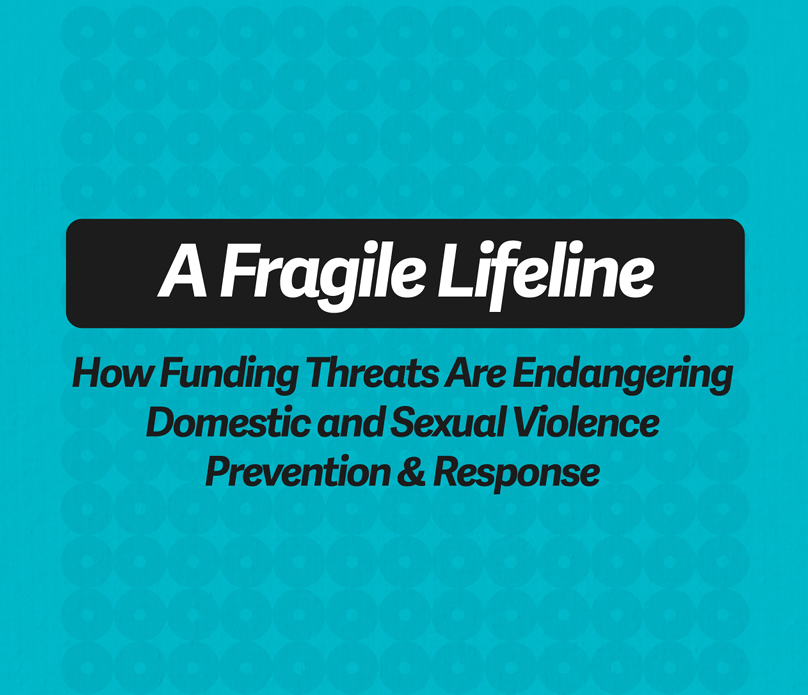Una frágil línea de vida: lo que nos contaron las organizaciones sin ánimo de lucro sobre las crecientes amenazas a los servicios de apoyo a las víctimas de violencia doméstica y sexual.

Today, we’re releasing a new report, “A Fragile Lifeline: How Funding Threats Are Endangering Domestic and Sexual Violence Prevention & Response.” The report was born out of urgent conversations with leaders of nonprofits across the domestic violence and sexual assault (DV/SA) sector around the world, who expressed growing concern over threats to cut U.S. federal funding, new restrictions on grants, and the dismantling of international developmental aid programs.
In response, we launched a global survey this spring to better understand how these shifts impact frontline DV/SA programs and services. Thanks to the many partners, allies, and service providers who participated, we were able to collect both quantitative and powerful qualitative insights for the report. The survey results reveal an increasingly precarious landscape for the sector and the victims/survivors and communities they support:
Funding instability has escalated across the sector.
97% of organizations that receive state or federal funding in the U.S. are concerned about this funding being disrupted.
Service disruptions are already widespread.
In the U.S., 80% of organizations said their ability to deliver services has been impacted, even ahead of anticipated cuts. Nearly half said this impact has been moderate to severe.
Core programs are experiencing high strain.
In the US, the programs most vulnerable to disruptions included shelter or refuge (96%), prevention (91%), DV/SA advocacy (88%), and other GBV services (100%). 65% of organizations in the U.S. and 55% internationally anticipated cuts to their staff this year.
Marginalized groups will be most affected by service disruptions.
81% of organisations flagged women as being most at risk from service cuts, followed by children (61%). LGBTQ+ individuals, migrants, and people with disabilities were also frequently cited.
Domestic and sexual violence nonprofit organizations have long been underfunded and underresourced. But today, with ongoing policy changes and the dissolution of USAID, many on the frontlines seem dangerously close to collapse.
One of the most impactful parts of this project was our time in conversation with direct service providers who help victims of violence in their greatest moment of need, e.g. when they attempt to leave an abusive relationship or report their sexual assault. We heard about the tolls of constant uncertainty, including the burnout that comes from being asked to do more with less and the weight of supporting vulnerable populations while their own communities are also being targeted.
What also stood out was how deeply interconnected these providers are with a broader ecosystem of care, including social welfare programs, housing assistance, and reproductive care. When these structures are destabilized, the entire system is weakened, increasing the risk of victims/survivors falling through the cracks and not getting the help they need.
Beyond these concerns, though, an unwavering commitment to survivors stood out in every conversation. Even in the face of mounting pressure, service providers continue to show up with compassion and deep-rooted resolve to protect the communities they serve.
There’s deep injustice in the erosion of services to respond to an epidemic of domestic and sexual violence that nearly one in three women and one in seven men in the U.S. experience in their lifetime. Survivors are forced to navigate a shrinking system with fewer roadmaps, while those working to support them are stretched to their limit. And yet, it’s precisely because of this reality that this project—listening to those on the frontlines and advocating for more sustainable support systems—is more meaningful than ever.
We hope this report shines a spotlight on a sector that has too often been overlooked; increases awareness of what’s at stake today for victims/survivors of abuse; and offers a resource for all those working toward lasting, systemic change.

Una frágil línea de vida: cómo las amenazas a la financiación están poniendo en peligro la prevención y la respuesta a la violencia doméstica y sexual
Juntos podemos acabar con la violencia doméstica y sexual






